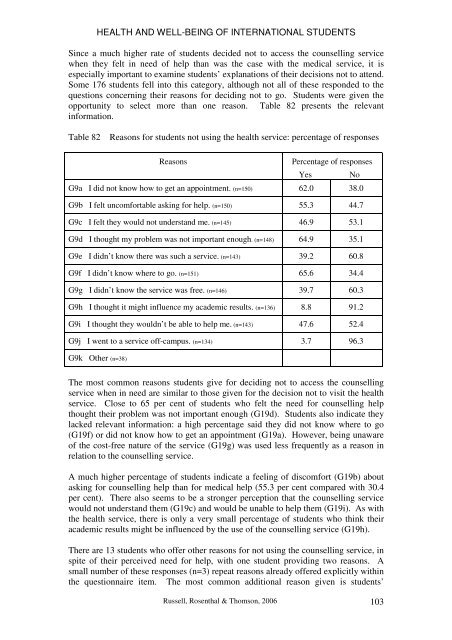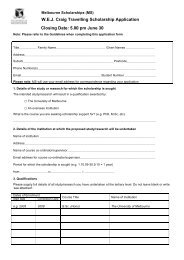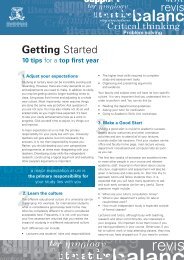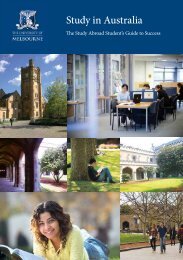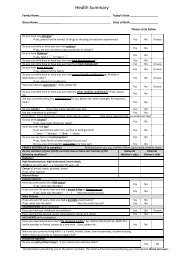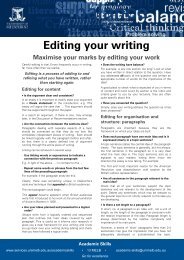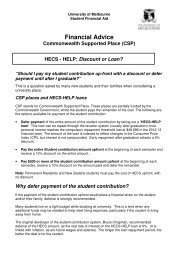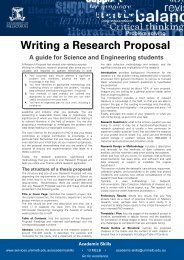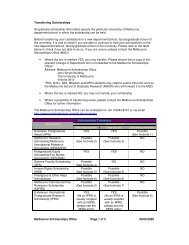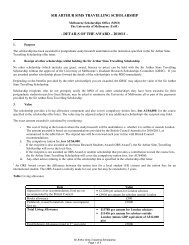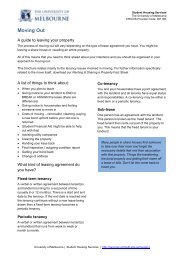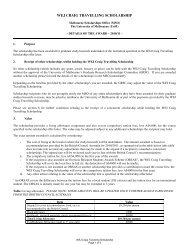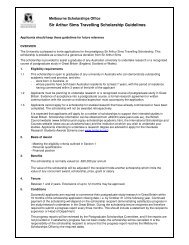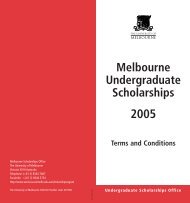a growing experience - Student Services - University of Melbourne
a growing experience - Student Services - University of Melbourne
a growing experience - Student Services - University of Melbourne
Create successful ePaper yourself
Turn your PDF publications into a flip-book with our unique Google optimized e-Paper software.
HEALTH AND WELL-BEING OF INTERNATIONAL STUDENTSSince a much higher rate <strong>of</strong> students decided not to access the counselling servicewhen they felt in need <strong>of</strong> help than was the case with the medical service, it isespecially important to examine students’ explanations <strong>of</strong> their decisions not to attend.Some 176 students fell into this category, although not all <strong>of</strong> these responded to thequestions concerning their reasons for deciding not to go. <strong>Student</strong>s were given theopportunity to select more than one reason. Table 82 presents the relevantinformation.Table 82Reasons for students not using the health service: percentage <strong>of</strong> responsesReasonsPercentage <strong>of</strong> responsesYes NoG9a I did not know how to get an appointment. (n=150) 62.0 38.0G9b I felt uncomfortable asking for help. (n=150) 55.3 44.7G9c I felt they would not understand me. (n=145) 46.9 53.1G9d I thought my problem was not important enough. (n=148) 64.9 35.1G9e I didn’t know there was such a service. (n=143) 39.2 60.8G9f I didn’t know where to go. (n=151) 65.6 34.4G9g I didn’t know the service was free. (n=146) 39.7 60.3G9h I thought it might influence my academic results. (n=136) 8.8 91.2G9i I thought they wouldn’t be able to help me. (n=143) 47.6 52.4G9j I went to a service <strong>of</strong>f-campus. (n=134) 3.7 96.3G9k Other (n=38)The most common reasons students give for deciding not to access the counsellingservice when in need are similar to those given for the decision not to visit the healthservice. Close to 65 per cent <strong>of</strong> students who felt the need for counselling helpthought their problem was not important enough (G19d). <strong>Student</strong>s also indicate theylacked relevant information: a high percentage said they did not know where to go(G19f) or did not know how to get an appointment (G19a). However, being unaware<strong>of</strong> the cost-free nature <strong>of</strong> the service (G19g) was used less frequently as a reason inrelation to the counselling service.A much higher percentage <strong>of</strong> students indicate a feeling <strong>of</strong> discomfort (G19b) aboutasking for counselling help than for medical help (55.3 per cent compared with 30.4per cent). There also seems to be a stronger perception that the counselling servicewould not understand them (G19c) and would be unable to help them (G19i). As withthe health service, there is only a very small percentage <strong>of</strong> students who think theiracademic results might be influenced by the use <strong>of</strong> the counselling service (G19h).There are 13 students who <strong>of</strong>fer other reasons for not using the counselling service, inspite <strong>of</strong> their perceived need for help, with one student providing two reasons. Asmall number <strong>of</strong> these responses (n=3) repeat reasons already <strong>of</strong>fered explicitly withinthe questionnaire item. The most common additional reason given is students’Russell, Rosenthal & Thomson, 2006 103


